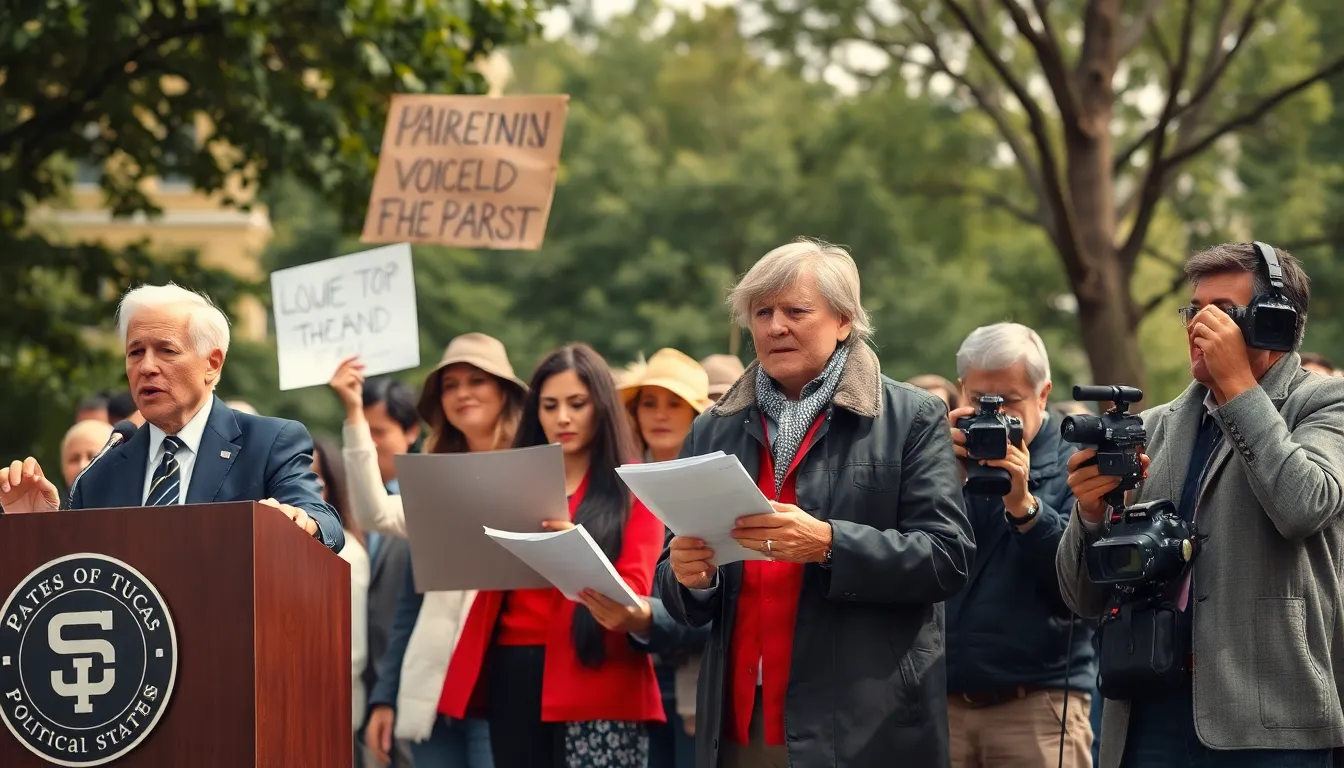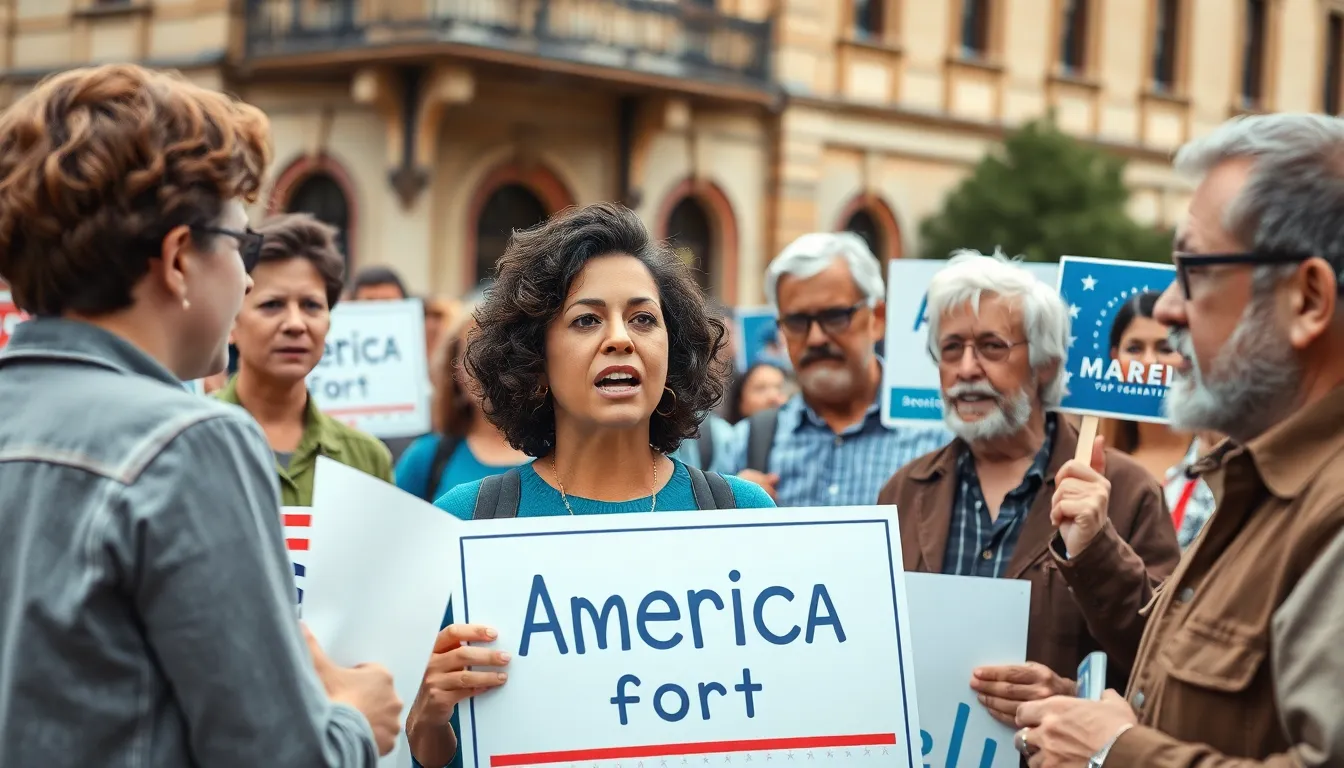Table of Contents
ToggleIn a world where political debates can feel like a circus, the voices that rise above the noise often capture the spotlight. Political voices shape opinions, influence policies, and sometimes even make people laugh—whether they mean to or not. From the impassioned speeches of seasoned politicians to the clever quips of social media influencers, these voices play a crucial role in the democratic landscape.
But what makes a political voice truly resonate? Is it charisma, wit, or the ability to connect with everyday folks? As the political arena evolves, so too does the way these voices communicate. Understanding the dynamics of political expression can empower citizens to engage more meaningfully in the conversation. So buckle up and get ready to explore the colorful tapestry of political voices that not only inform but also entertain.
Overview of Political Voices
Political voices play a crucial role in shaping public opinion and influencing policy in today’s chaotic political landscape. Diverse figures, including seasoned politicians and social media influencers, contribute to this landscape, each bringing unique perspectives.
Definition and Significance
Political voices represent individuals or groups that articulate ideas, beliefs, and values related to governance and public affairs. These voices impact discussions and decisions about pressing issues, significantly influencing political outcomes. Effective political voices resonate with citizens through various traits, including charisma or relatability. Engaging with these voices fosters informed public discourse, encouraging citizens to participate in democratic processes actively.
Historical Context
Political voices have evolved throughout history, reflecting societal shifts and technological advancements. Ancient orators, political pamphleteers, and radio hosts shaped public sentiment in their eras. The advent of television introduced new dynamics, allowing political figures to connect directly with audiences. In recent decades, social media platforms disrupted traditional communication channels, enabling grassroots movements. Now, a more diverse group of influencers emerges, providing varied viewpoints in the democratic conversation.
Types of Political Voices

Political voices can be categorized into two main types: individual voices and collective voices. Each type plays a crucial role in shaping political dialogue and influencing public opinion.
Individual Voices
Individual voices encompass a wide range of influential figures. Politicians often use their personal charisma and public speaking skills to sway voters. Activists articulate their beliefs passionately, driving social change through personal experience. Celebrities leverage their platforms to engage audiences, bringing attention to political issues. Scholars contribute through research and thought leadership, impacting policy discussions. Journalists analyze current events, enabling informed public discourse. Each individual voice carries unique perspectives and can effectively mobilize communities.
Collective Voices
Collective voices represent groups and organizations advocating for common interests. Political parties unify members around shared ideologies, influencing legislative processes. Advocacy groups amplify marginalized perspectives, ensuring underrepresented issues gain visibility. Unions rally workers to demand fair treatment and economic rights, impacting labor policies. Grassroots movements mobilize citizens at the local level, demonstrating the power of community action. Coalitions combine resources and expertise, strengthening efforts to effect change on a larger scale. Together, collective voices foster collaboration and create a more inclusive political landscape.
Platforms for Political Voices
Political voices thrive on various platforms, shaping public opinion and engagement. These platforms include traditional media and social media, each playing a significant role in political discourse.
Traditional Media
Traditional media, such as newspapers, television, and radio, has long been a key avenue for political voices. Major news networks like CNN and BBC deliver comprehensive coverage of political events, influencing public perceptions. Newspapers provide in-depth analysis and opinion pieces from experts, fostering informed discussion. Additionally, talk radio offers personal insights and lively debates, engaging listeners in current political issues. Each medium provides a unique approach to storytelling, ensuring diverse viewpoints reach a broad audience.
Social Media
Social media revolutionizes how political voices connect with citizens. Platforms like Twitter and Facebook allow politicians, activists, and ordinary individuals to share messages instantly. Engagement levels increase as followers share content, amplifying political causes and movements. Influencers can sway public opinion through personal narratives, making politics more relatable. Real-time interaction fosters dialogue, enabling stakeholders to discuss experiences and advocate for change collectively. Social media’s immediacy ensures that voices often overlooked in traditional media gain visibility and resonance.
The Impact of Political Voices
Political voices shape public opinion and influence policy decisions significantly. They act as catalysts for change, compelling citizens to engage in discussions that matter.
On Public Opinion
Public opinion reflects the collective attitudes and beliefs of individuals regarding political issues. Influential figures, such as politicians and social media influencers, rally support through relatable narratives that resonate with audiences. Social movements, often driven by activists, emphasize specific issues and mobilize communities, altering how people perceive political discourse. Traditional media still plays a vital role in framing issues, but social media empowers diverse voices, allowing lesser-known activists to challenge prevailing narratives. A study by the Pew Research Center found that 49% of Americans use social media as a primary news source, underscoring its impact on shaping public opinion.
On Policy Making
Policy making hinges on the influence of political voices that advocate for specific changes. Diverse advocates, including interest groups and grassroots organizations, amplify issues and encourage public support. Members of Congress and local officials rely on feedback from constituents, making public sentiment critical in decision-making processes. Empirical evidence shows that when communities actively engage with political voices, they can significantly impact policy outcomes. For example, data from the Center for American Progress suggests that outreach campaigns can increase community participation in policy discussions by up to 80%, demonstrating the power of collective advocacy.
Challenges Faced by Political Voices
Political voices encounter various challenges that affect their influence and effectiveness.
Censorship and Freedom of Speech
Censorship limits the ability of political voices to express ideas freely. Governments and private entities often restrict certain content, impacting public discourse. Various platforms impose guidelines that can silence dissenting opinions, leading to self-censorship among individuals and organizations. Studies show that 36% of Americans have experienced suppression of their political beliefs online. Freedom of speech faces challenges as political debates become increasingly polarized, discouraging voices from articulating diverse perspectives. The consequences of censorship erode democratic engagement, stifling meaningful conversations necessary for political progress.
Misinformation and Disinformation
Misinformation and disinformation pose significant threats to political voices. Misinformation often spreads unintentionally, leading to misunderstandings about critical issues. Disinformation, however, involves deliberate falsehoods aimed at manipulating public perception. A report from the Pew Research Center indicates that 64% of Americans believe misinformation is a major problem for society. These false narratives skew public understanding, creating barriers for political voices attempting to relay accurate information. As a result, navigating these challenges requires vigilance and the promotion of media literacy among citizens to foster informed political engagement.
Political voices play a crucial role in shaping the landscape of public discourse and policy-making. Their influence extends beyond traditional boundaries thanks to advancements in communication technology. As citizens navigate this complex terrain, understanding the dynamics of these voices becomes essential for meaningful engagement.
The interplay between individual and collective voices highlights the diverse perspectives that enrich political discussions. While challenges like censorship and misinformation threaten these voices, the power of informed engagement remains vital. By fostering media literacy and encouraging open dialogue, society can empower a broader range of voices to contribute to the democratic process. This ongoing evolution underscores the importance of staying connected and informed in today’s political climate.








